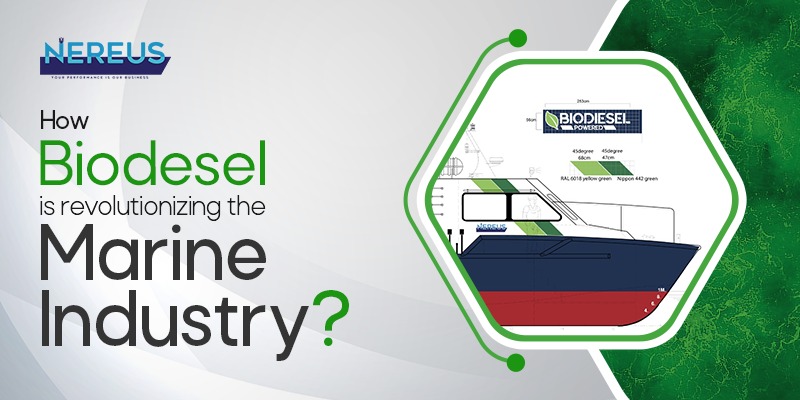Air pollution at sea can be largely attributed to exhaust gases emitted by marine engines, which are a significant source of seaborne emissions resulting from the combustion of marine fuels. The release of these gases can have a detrimental impact on both the environment and human health.
As a solution to the problem, biodiesel fuel has been identified as an environmentally friendly alternative energy source that can help to reduce toxic gas emissions from ships while also reducing dependence on petroleum-based fuels. The adoption of biodiesel technology in dive boats is a significant step towards achieving a sustainable and carbon-neutral future.
In this blog, Nereus Subsea , a well known marine company in UAE, will discuss what is biodiesel and how it is revolutionizing the marine industry.
How Does Biodiesel B20 Help In Reducing Carbon Footprint?
Biodiesel is a renewable, non-toxic, clean-burning fuel, which can be a great alternative to conventional diesel. Biodiesel burns cleaner with reduced air emissions, including a decrease in soot, smoke, carbon monoxide and greenhouse gas emissions.
Biodiesel B20 is identified as one of the potential resources that fulfil the world’s energy demand and can be a prominent candidate as an alternative to petroleum-based fuels.
Biodiesel B20 can help in reducing the carbon footprint of ships and vessels in several ways:
Reduced greenhouse gas emissions:
Biodiesel B20 is a blend of 20% biodiesel and 80% conventional diesel. By using B20 instead of conventional diesel, ships and vessels can reduce their greenhouse gas emissions by up to 20%.
Improved engine performance:
Biodiesel has a higher cetane rating than conventional diesel, which means it ignites more quickly and burns more efficiently. This can result in improved engine performance and fuel efficiency, leading to further approx. 74 % of reduction in carbon emissions.
Cleaner emissions:
Biodiesel has lower levels of sulfur and other harmful pollutants than conventional diesel, resulting in cleaner emissions. This can help ships and vessels meet stricter emissions regulations and reduce their impact on the environment.
Renewable and sustainable:
Biodiesel is made from renewable sources and can be produced locally, reducing dependence on foreign oil. It is also biodegradable and non-toxic, making it a more sustainable fuel choice.
Overall, the use of biodiesel B20 in ships and vessels can significantly reduce their carbon footprint and contribute to a more sustainable future for the shipping industry
Benefits of Using Biodiesel-driven engines in the marine industry
The marine industry plays a critical role in global trade, transportation, and tourism. However, this industry is responsible for a significant amount of greenhouse gas emissions and other pollutants that contribute to environmental degradation. The prospect of renewable energy is seen to be very promising in the near future. Biodiesel-driven engines can provide several benefits to the marine industry, including:
- Reduced greenhouse gas emissions: Biodiesel is a renewable fuel and has a lower carbon footprint than conventional diesel fuel and produces fewer greenhouse gas emissions. The use of biodiesel in marine engines can help reduce the industry’s contribution to climate change.
- Cost-effectiveness: Biodiesel is typically more expensive than conventional diesel fuel. However, the long-term benefits of using biodiesel, including reduced emissions and improved air quality, can outweigh the higher initial costs.
- Compliance with regulations: Many countries have regulations in place to limit greenhouse gas emissions and other pollutants from the marine industry. Using biodiesel can help companies comply with these regulations and avoid penalties.
- Environmental sustainability: The production of biodiesel from waste vegetable oils or animal fats can contribute to the circular economy and reduce waste. The use of biodiesel can also help preserve marine ecosystems by reducing the pollution associated with conventional diesel fuel.
The adoption of biodiesel in the marine industry can help mitigate the industry’s impact on the environment and contribute to a more sustainable future.
Contact Nereus Subsea for high- quality underwater services in Singapore.
Green Dive Boats With Biodiesel-Driven Engines
As part of their commitment to sustainability and reducing carbon emissions, businesses are increasingly integrating biodiesel into their operations. Specifically, biodiesel-powered engines are being utilized to propel dive boats, with the aim of minimizing their carbon footprint.
Green dive boats enhance sustainability in global operations by following environmentally sensitive policies. The use of biodiesel in a boat’s engine will reduce the carbon emissions of Nereus Subsea’s operations significantly.
Nereus Subsea’s green dive boat and biodiesel-driven engines are expected to have a significant impact on the company’s operations, making them more environmentally friendly and sustainable.
With a focus on innovation, Nereus Subsea is continuously looking for new and better ways to improve its operations and promote sustainable practices in the marine industry . By 2025, we are committed to transitioning to completely carbon-neutral operations. To achieve this goal. Our first major initiative is the introduction of a green dive boat.
Nereus Subsea delivers a broad range of underwater hull cleaning services across the world, specializing in underwater ship surveys & inspections, underwater maintenance & repair, salvage & recovery and other specialist services to a large and diversified client base.

